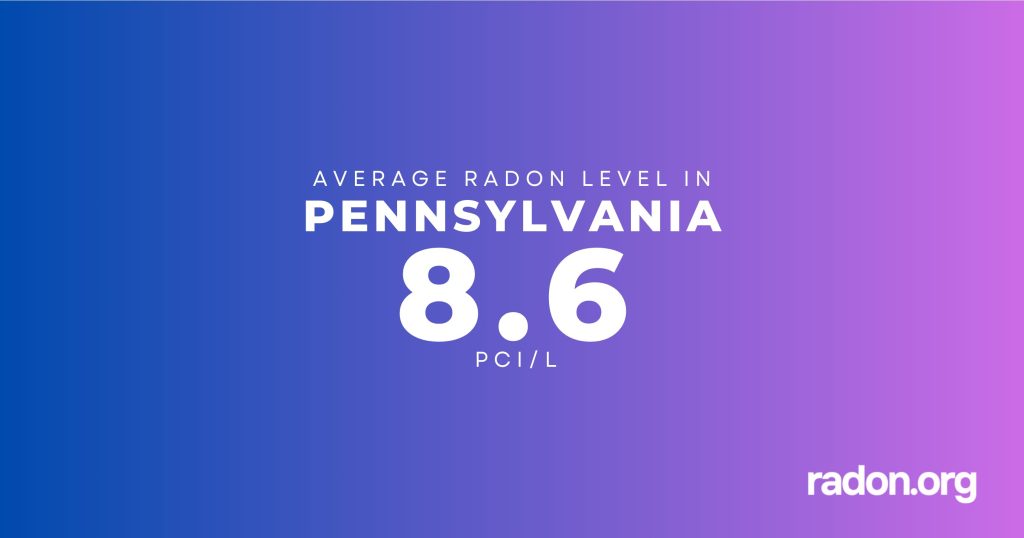Average Radon Level In Pennsylvania: 8.6
The EPA advises that any home or building in Pennsylvania with radon levels at or exceeding 4.0 pCi/L should undergo mitigation. Additionally, the World Health Organization (WHO) sets a lower threshold, recommending action for radon concentrations of 2.7 pCi/L or above.
- EPA's Action Level: 4.0 pCi/L
- WHO's Action Level: 2.7 pCi/L
- Average Level In Pennsylvania: 8.6 pCi/L
Living or working in areas with elevated radon levels can pose significant health risks. The only reliable method to ascertain the radon concentration in your specific home or building is through radon testing. This is a crucial step in ensuring your environment is safe and adheres to recommended health standards.

Understanding Radon in Pennsylvania
Radon in Pennsylvania is a significant concern due to the state’s geology, which contributes to some of the highest radon levels in the country. This naturally occurring radioactive gas is invisible, odorless, and tasteless, making it difficult to detect without proper testing. The Environmental Protection Agency (EPA) has identified Pennsylvania as a Zone 1 state, indicating that radon levels in Pennsylvania are expected to exceed the EPA’s action level of 4 pCi/L. This poses potential health risks to residents, making it crucial to understand and mitigate radon exposure.
The Health Risks For Radon In Pennsylvania
Exposure to high radon levels in Pennsylvania can lead to serious health issues. The radioactive particles from radon can damage lung tissue, leading to:
- Increased risk of lung cancer, even among non-smokers
- Potential health risks to children, as they have higher respiration rates
- Long-term health complications with prolonged exposure
Radon Levels in Pennsylvania
Pennsylvania, a state located in the Northeastern and Mid-Atlantic regions of the United States, has been identified as having some of the highest radon levels in the country. Radon is a naturally occurring radioactive gas that can cause lung cancer. It is colorless, odorless, and tasteless, making it difficult to detect without proper testing.
Radon Levels in Pennsylvania: Key Facts
- Pennsylvania has one of the most serious radon problems in the United States. Approximately 40% of Pennsylvania homes have radon levels above Environmental Protection Agency’s action level.
- On average, the radon levels in Pennsylvania are higher than the national average. The average indoor radon level is 1.3 pCi/L in the United States, while in Pennsylvania, it is 7-8 pCi/L.
- Every county in Pennsylvania is prone to high radon levels, and it is estimated that nearly one in 15 homes in Pennsylvania have radon levels above the recommended action level.
- The highest radon level ever recorded in Pennsylvania was 3,715 pCi/L, which is significantly higher than the EPA’s recommended action level of 4 pCi/L.
Testing for Radon in Pennsylvania
Due to the high levels of radon in Pennsylvania, it is recommended that all homes and buildings in the state be tested for radon. The Pennsylvania Department of Environmental Protection (DEP) provides information and resources on how to test for radon and what to do if your levels are high.
Reducing Radon Levels
If high levels of radon are detected in a home or building, it is important to take steps to reduce the radon levels. This can be done through a process called radon mitigation, which involves installing a system to vent the radon gas out of the building.
Radon and Health Risks
Long-term exposure to high levels of radon can lead to lung cancer. In fact, radon is the second leading cause of lung cancer in the United States, after smoking. It is estimated that radon causes about 21,000 lung cancer deaths per year in the United States.
Additional Resources About Radon Levels In Pennsylvania
Here are some resources for reading about radon levels in Pennsylvania:
- Pennsylvania Department of Environmental Protection – Radon Division: This page provides information about radon in Pennsylvania, including testing, mitigation, and certification.
- Pennsylvania Department of Health – Radon: This resource offers information about the health risks of radon, how to test for it, and what to do if your home has high levels of radon.
- U.S. Environmental Protection Agency – Pennsylvania Radon Information: This page provides information about radon zones in Pennsylvania and contact information for state radon programs.
- Radon.com – Radon Levels: This resource provides a map of radon levels by county in Pennsylvania, as well as other states.
